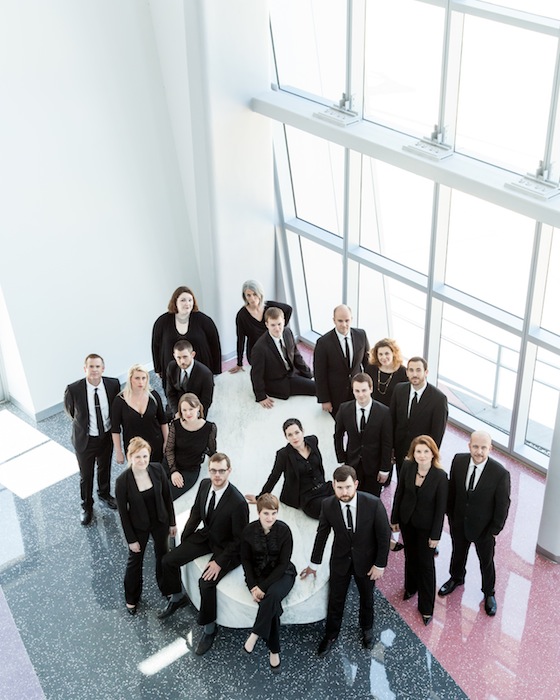Seraphic Fire opens 16th season with rare and remarkable Monteverdi

Seraphic Fire performed Monteverdi’s “Selva Morale et Spirituale” Wednesday night at St. Sophia Greek Orthodox Cathedral in Miami.
The music of Claudio Monteverdi bridged the Renaissance and Baroque eras. This Italian master broke new ground in the creation of opera and sacred music and his scores remain astounding some 400 years after their conception.
To open Seraphic Fire’s 16th season, artistic director Patrick Quigley presented a Monteverdi rarity–highlights from the Selva Morale et Spirituale—Wednesday night at St. Sophia Greek Orthodox Cathedral in Miami. A series of sacred works published in 1640 and 1641 and written for the Basilica of San Marco in Venice , these scores represent Monteverdi at the peak of his powers.
As a prelude to the evening’s featured work, Quigley premiered In Columna by Chicago-based composer Drew Baker, the last of a series of commissions for the choir’s 15th anniversary. Baker was specifically requested to write a piece that would set the meditative atmosphere for the Monteverdi works and he has succeeded admirably. Utilizing the same eight voices and instrumental forces as the 17th century Venetian works, Baker’s New Age vignette mixes mostly quiet high vocal writing with restless instrumental undertones. As the singers left the platform, an extended finale for two violins, cello, therbo and organ comprised a serene coda. Quigley’s singers fearlessly encompassed Baker’s vocal demands and the composer was present to acknowledge the audience’s warm applause.
Quigley offered around 70 minutes of excerpts from the extensive Monteverdi compilation. Monteverdi’s pathbreaking liturgical scores moved beyond the Gregorian chant that was the basis of religious music in prior eras toward the new Baroque models that encompassed madrigals, solo and response interchanges and contrasts of tempo and ambiance.
The pieces sung by the eight choir members wonderfully illustrated the felicitous melodies, thematic variety and mastery of vocal writing that set Monteverdi apart from other composers of his time. With the exception of the “Kyrie” and “Salve Regina,” which were more traditionally sacred in mood and tone, much of the melodic writing in these works would not have been out of place in Monteverdi’s operas.
The lilting principal theme of the opening “Beatus vir” showcased the purity of Margot Rood’s high soprano. The four male voices added firmness and depth and their timbres blended well with the two sopranos.
Quigley set crisp tempos that became broader in the score’s more dramatic sections. Meredith Ruduski’s light soprano was strong and distinctive in the solos on “O ciechi, ciechi.” Steven Eddy’s warm bass tone also commanded solo moments and Quigley finely pointed changes of mood between darkness and light. The sonority of the unaccompanied voices in the solemn “Kyrie” reverberated through the sanctuary in a time-stopping moment.
A series of solos, duos and trios gave the singers opportunities to display their formidable instruments. With a vigorous continuo of only cello, therbo and organ as backing, Douglas Dodson’s agile countertenor, bright sonority and dazzling technique in “Laudate Dominum in sanctis eius” provided one of the evening’s vocal thrills. Ruduski’s incisive vocal attack and rapid text enunciation highlighted the Handelian aria “Sanctorum meritis.” The contrasting timbres of Rood and Ruduski delighted in the sprightly duet “Iste confessor.”
In “Confitebor tibi Domine,” Rood’s pitch-perfect combination of fervor and flexibility, Patrick Muehleise’s beautiful, evenly produced lyric tenor and James K. Bass’ robust bass blended in coloratura writing that seemed to presage the world of bel canto opera that lay ahead. The lit candles on the rostrum perfectly enhanced the darkness of “Salve Regina” with Dodson, Bass and the excellent tenor Steven Stoph in superb form. Dodson, Muehleise and Eddy tossed the bouncing phrases of “Chi voi che m’innamori” between each other with near perfect articulation and timing.
In the final “Dixit Dominus,” the full component of voices produced a corporate sonority that sounded twice as large as their number. Miami- based Amanda Crider’s burnished, oaky mezzo was exciting in dexterity during her fiery solos.
Quigley’s direction encapsulated the combination of reverence and drama at the heart of Monteverdi’s scores. Playing without vibrato and with flawless coordination, violinists Adriane Post and Laura Rubinstein-Salzedo, cellist Gary Fishman, organist Justin Blackwell and therbo John Lenti comprised the outstanding instrumental component.
There are three remaining performances of these rarely performed Monteverdi gems. This remarkable music and outstanding performance are not be missed.
Seraphic Fire repeats the program 7:30 p.m. Thursday at All Souls Episcopal Church in Miami Beach, 7:30 p.m. Friday at First United Methodist Church in Coral Gables, and 7:30 p.m. Saturday at All Saints Episcopal Church in Fort Lauderdale. seraphicfire.org
Posted in Performances
Leave a Comment
Thu Oct 19, 2017
at 2:25 pm
No Comments
